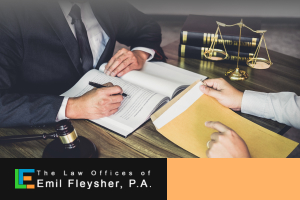This page was written, edited, reviewed & approved by Emil J. Fleysher following our comprehensive editorial guidelines. Emil J. Fleysher, the Founding Partner, has 15+ years of legal experience as a bankruptcy attorney. Our last modified date shows when this page was last reviewed.

Bankruptcy is an unfortunate reality of modern life, but we have to deal with the process when it becomes necessary. Many people are unfamiliar with how Chapter 13 bankruptcy works or what a Chapter 13 bankruptcy lawyer does.
If you are considering Chapter 13 bankruptcy to take control of your finances, please keep reading. This blog post will discuss what you should know about Chapter 13 bankruptcy, what to expect from your bankruptcy lawyer, and how the process works.
Chapter 13 bankruptcy is a court-supervised payment plan in which the bankruptcy debtor pays his or her secured and unsecured creditors a monthly amount based on the debtor's household income and reasonable costs.
The debtor's "Chapter 13 plan" consists of monthly installments and amounts paid to different creditors.

Chapter 13 Bankruptcy reorganization is exclusively available to individuals. If you have business debt and want to file Chapter 13, you must file as an individual. But, you may include any business-related obligations for which you are personally liable (including personal guarantees).
Your eligibility to file Chapter 13 Bankruptcy may be determined by local bankruptcy attorneys, but in general:
You must demonstrate that you have filed your federal and state income tax returns for the last four years.
Currently, you are barred from filing if your unsecured debts exceed $465,275 or your total secured debts exceed $1,395,875. These limits are established by the Bankruptcy Court and change periodically.
You must show that you have enough consistent income to repay your creditors. You can use to fund your repayment plan using wages, unemployment benefits, commissions, or pension payments. If you are married, your spouse's salary counts too.
Chapter 13, like Chapter 7, requires proof that you obtained credit counseling from an authorized agency within 180 days before filing bankruptcy. Furthermore, you cannot file if you have had a bankruptcy case dismissed or have failed to comply with bankruptcy court requirements within the last 180 days.
Many individuals prefer not to file for Chapter 13 bankruptcy since it demands repayment of at least some debt. However, it may be the right choice for you if:
In Chapter 13, you'll pay off student loans, tax obligations, and other debts that cannot be discharged in Chapter 7.
Chapter 13 lets you save your personal property, including those non-exempt ones.
You may avoid foreclosure or repossession proceedings if you make timely payments and catch up with late payments.
As long as you adhere to the court-ordered payment schedule, your creditors will not seek payment from your co-signer on your loan or credit card.

There are numerous advantages to filing bankruptcy through a bankruptcy lawyer. Generally, your retainer agreement (the contract you and your bankruptcy lawyer sign) will specify the services your lawyer will perform. Your lawyer's responsibility is also to offer professional counsel throughout the bankruptcy process.
To begin, you may expect your attorney to advise you on whether filing Chapter 13 bankruptcy is in your best interests. If this is the case, you should further learn:
If you have any questions, you can expect your attorney to respond to your emails or calls or emails ASAP.
Not all bankruptcy cases are complex, but they aren't all simple, either. Your attorney should have the requisite level of skills to manage your case in any scenario.
In general, the complexity of your bankruptcy will be determined by:
Ask whether the lawyer has represented clients in similar situations in the past.
Filing for Chapter 13 bankruptcy requires the completion of a lengthy bundle of paperwork. Almost all bankruptcy lawyers use specialized software to prepare and file the necessary bankruptcy documents with the court.
You will present your attorney with your financial information, including income, expenses, assets, and debt information. Your lawyer will utilize it to prepare the official forms. Then you and your lawyer will go over the finished paperwork to ensure correctness.
You may also be required to present additional paperwork to the court or the trustee. Your attorney will make sure to do so as soon as possible since failing to meet a bankruptcy deadline might result in:
For these reasons, knowing the local regulations and filing processes is one of your bankruptcy attorney's obligations.

After filing for Chapter 13 bankruptcy, all debtors must attend a mandatory hearing known as the 341 meeting of creditors. However, depending on your situation, you (or your lawyer) may be required to attend additional hearings.
The following are some of the common types of hearings your bankruptcy lawyer will represent you at:
In most circumstances, your attorney will be able to inform you about the hearings you should expect to attend before you file your case.
The following is the outline of the filing procedure:
You can also read our blog where we discuss the steps for filing for Chapter 13 bankruptcy.

All Chapter 13 bankruptcy attorneys provide one thing: debt relief. What separates one from another is the amount of knowledge, experience, and dedication to the process they bring to the table.
So, while you seek a good bankruptcy lawyer to hire and handle your debt, look for these special qualities. Not every lawyer has them, but those who do are worth seeking out.
If you are in Florida and are considering filing for bankruptcy, talk to one of our Chapter 13 bankruptcy attorneys at the Law Offices of Emil Fleysher to schedule a free case evaluation protected by an attorney-client relationship. We will do everything we can to help you get back on track.
You can reach us at 888-886-0020 or through our online contact form.

Emil specializes in consumer bankruptcy, debt settlement, and mortgage modification, offering a holistic approach to solving mortgage and debt problems. Emil listens to clients, understands their circumstances and goals, and helps them make the right choices by presenting all options and contingencies.
He is dedicated to helping South Floridians regain their financial freedom from overwhelming debt caused by high interest credit cards, bad mortgage loans, and uninsured medical expenses.

"*" indicates required fields